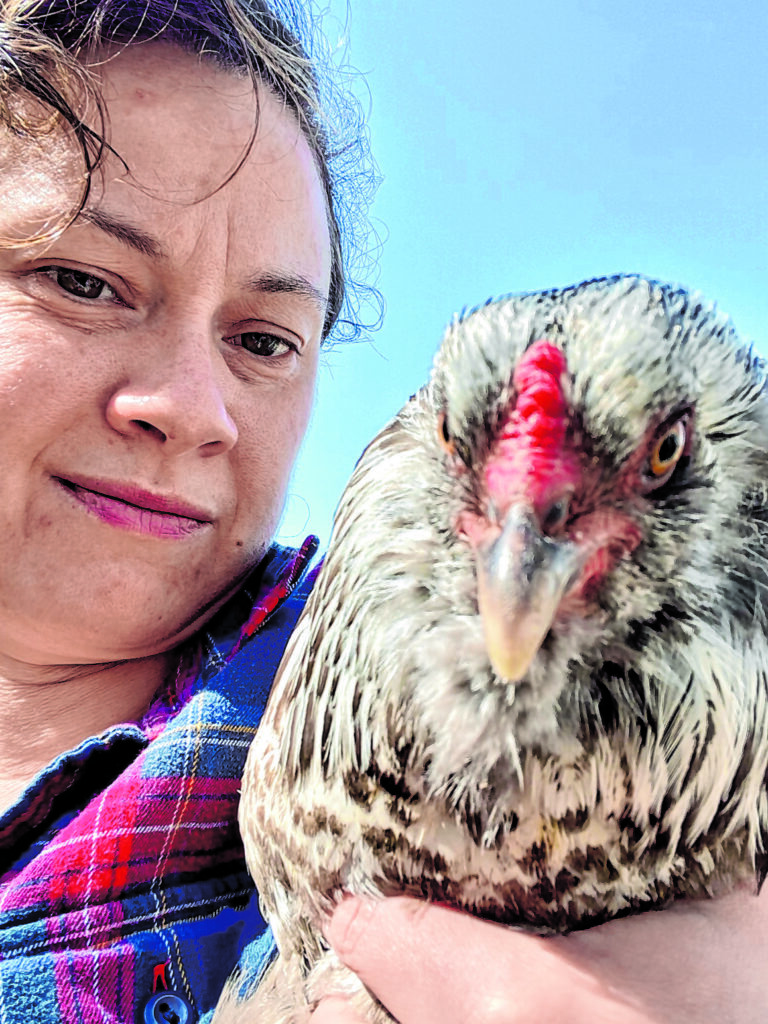The number of people keeping backyard chickens has exploded in the last few years. The pandemic only served to accelerate this trend, since people were stuck at home and encouraged to find outdoor activities. Watching your personal flock is a relaxing way to take your mind off the chaos of the outside world, and they are a pet with benefits: delicious, fresh eggs.

(Photo by Amanda Olsen)
Observing chickens is a relaxing, mesmerizing way to spend time. People are often surprised by how gregarious and curious chickens can be. Each bird has its own personality.
Some are very interested in people, to the point that you can teach them to come when called. They will eat out of your hand and jump up into your lap for pets. Others are more cautious. Some chickens are sneaky and will find an out of the way place to hide and lay their eggs, ignoring the nest box completely. Interacting with your chicks on a daily basis when they are still small can help them grow accustomed to people and being handled, but some hens are just unfriendly.
Pet chickens can be a great hobby, but they are by no means low maintenance. Like all animals, they need constant access to food and water, shelter, and a place to get out and exercise. Chickens will fight, especially if they don’t have enough space. They don’t call it a ‘pecking order’ for no reason. Their enclosure also needs to be secure from predators.
Raccoons, opossums, foxes and hawks are all a threat to your flock. Sturdy doors on all entrances and a roof for your pen are a must. Burying the wire for your pen will also help.
Keep in mind that most vets will not treat chickens, so you’ll need to handle medical issues yourself. This can range from a foot infection to mites to end of life care.
Another reality to come to terms with: keeping chickens attracts rodents. Metal food containers and a treadle feeder can help mitigate this issue. Rodents will chew through plastic, so metal is a must. The treadle feeder minimizes both access and spillage. The platform that opens the feed trough is set to a chicken’s weight, so when the chicken steps on it they can feed, but a rat is too light.
You will also need to deal with their poop. Chickens poop 24 hours a day, even while they sleep. This amounts to some serious manure. This accumulation can smell, and if you free range your birds it will be everywhere in your yard. Most coops will need the bedding changed once a month and a deep clean at least twice a year, usually in spring and fall.
Chickens can live 10 years, so it’s important to plan accordingly. Egg laying falls off significantly as they age, with the first two years being the most productive. You can increase the size of your flock by twos over time but integrating new birds can be difficult.
It’s important to know the rules for your town before spending money. Plenty of places forbid chickens altogether. Others limit the number of birds and the size of your set up.
There are often bans on roosters because they are noisy and can be aggressive.
So what if you are moving, your hens stopped laying, or the upkeep is overwhelming? What if your batch of six chicks ends up as five hens and rooster? Or maybe you’ve run afoul of the town and have to rehome your flock. If you purchased from a private party, you can try reaching out to see if they will take back your birds. You can contact local chicken groups on social media. There are also a few chicken rescues on Long Island that may take in surrendered chickens or help owners find new caretakers for their birds.
Most importantly, it is a crime to abandon any domesticated animal. Leaving your chickens in a park or patch of woods will only result in a very short, scary time for those birds and could result in charges.
Written by Amanda Olsen



















